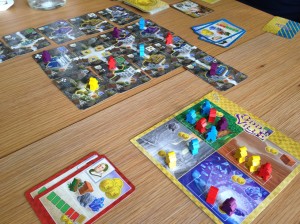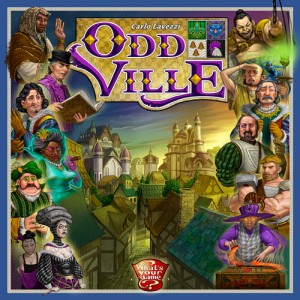Posted by James (admin) on 3rd December 2012

Oddville is a eurogame with a city building theme and a very compact game design. By that, I don’t mean its physical playing-size on the table; instead, I mean that the game mechanics are neatly compressed. As a result, Oddville contains a clever, inventive design with more game than you may expect from a relatively short game.
During the game player’s gain resources, money and characters as well as construct buildings so they can score the most victory points (VPs). The game ends as soon as any player places their 6th worker in the city.
Each player has their own deck of 4 action cards. On their turn, a player can play 1 action card which allows them to either gain the cash shown, or gain 1 of the resources shown, or gain 1 building from the 6 building cards on display (the card affects the price). The cards range from strong to weak and the player gets these cards back once they have used all 4, or they can spend cash to get all used ones back (but the more cards still hand, the greater the cost).
When a player chooses to gain one of the resources on their action card, they place one of their workers on the lowest market price for that resource (which are limited in number) and pays the price. The worker on the board shows the player has that resource until they spend it when building. The game scales with 2 players as there are fewer cheap resources available. Read the rest of this entry »
Tags: board game news, Board Games, board gaming, Essen, Oddville, Spiel 2012
Posted in Board Game Review, Board Games, Essen Spiel 12, Oddville | 3 Comments »
Posted by James (admin) on 12th October 2012
Shadows Over Camelot Card Game (Days of Wonder)
The original Shadows Over Camelot was an excellent semi co-op game that you could get fairly light gamers to play. The new card game version sounds intriguing as it has many of the same elements but a different core game mechanic. Similar to the board game, it’s co-operative but there may be a traitor. Each turn a player can turn over a card from the deck – many are rumours about the different quests (with icons showing the strength of the rumour) and there are other cards that affect gameplay like players not being allowed to communicate. These cards get added to the ‘threat’ pile. Instead of drawing a new card, a player can choose one of the quest icons on the previously drawn card and go on that quest. This means they sort out the threat pile into the separate quests and activate any Merlin and Morgana cards which can help or hinder the questing player. If the total number of rumour icons for the chosen quest is 11, 12 or 13 then the player succeeds and one of the 7 white swords required to win is gained (otherwise, they gain one of the 7 black swords which will lose the game). However, the rumour icons on the other quests are also added up too and can result in black swords if there are 14+ of their rumour icons. So, it’s a sort of push-your-luck game (with players trying to remember how many icons of each quest have gone past and what other cards are in there too). Like the original game, players can also accuse each other of being a traitor too.
Check out the details and rules at Days of Wonder’s web site: bga.me/soccard
Asgard (What’s Your Game)
What’s Your Game have published some great games in the past (like Vinhos and one of my favourite worker placement games Vasco de Gama). After releasing no new games last year, it’s great to see they have two this year. Asgard is a viking-themed, worker placement game where players place workers (influence) on different locations (gods) with lots of options and interesting decisions. The worker placement is interesting as players secretly select on which gods they will place workers, then take turns revealing one location and placing a worker (which sets the specific action for that god), and then take turns using each worker (and some get benefits for being the first one used on that god). There’s a lot more to it too. For more detailed info, check out my full On The Radar: Asgard piece for more info. Sounds really interesting.
Oddville (What’s Your Game)
Oddville looks like it will contain an interesting mix of tile laying to build a city and using cards to gain resources. Each card can only be used for one of its three uses – cash, resources or buildings – I always like multi-use cards in a game. When players build a building, they place it to expand the city and gain bonuses including gaining characters which give special abilities. At the end of the game, VPs are scored for the buildings each player built (they all score in different ways), characters and remaining resources.
There are some other nice sounding game mechanics too like the way the players pay for resources by putting their worker on one of the limited market prices which determines how much it costs and shows they have that resource until they spend it to build a building. Also, when obtaining a building, the card shows which of the buildings on display are free and which will cost money. So, it sounds like a very interesting and clever eurogame. For more detailed info, check out my full On The Radar: Oddville piece for more info.
James
Tags: Asgard, board game news, Board Games, board gaming, Days of Wonder, Essen, Oddville, Shadows Over Camelot Card Game, Spiel 2012, What's Your Game
Posted in Asgard, Board Games, Essen Spiel 12, Oddville, On the Radar, Shadows Over Camelot Card Game | No Comments »
Posted by James (admin) on 12th October 2012
 From reading the rules, Oddville looks like an interesting mix of using cards to gain resources and tile-laying to build a city. Now that may sound like a lot of other games but the game mechanics of Oddville look inventive and slick.
From reading the rules, Oddville looks like an interesting mix of using cards to gain resources and tile-laying to build a city. Now that may sound like a lot of other games but the game mechanics of Oddville look inventive and slick.
On your turn, you play 1 card from your hand or build 1 building. When a player plays a card, they can do 1 of the 3 things on the card – gain the cash shown, gain 1 of the resources shown, or gain 1 building from the 6 building cards on display (the card affects the price). I always like games where cards can be used for multiple purposes as it usually creates some interesting decision-making on how to combine the cards best and, hopefully, can be combined differently to give you alternate options if you need to change strategy.
When a player chooses to gain one of the resources on their played card, they place one of their workers on one of the market prices for that resource which are limited in number – this determines how much the resource costs plus the worker shows the player has that resource until they spend it to build a building. This should make for interesting competition over the lowest prices.
When a player chooses to gain a building, their card determines which of the 6 buildings on display are free and which will cost cash – the ones on the left (the oldest) are the ones most likely to be free. This sort of mechanic is in other games (like Gloria Mundi) and I like it because it makes newly added buildings (added to the right-end of the row) generally more expensive. Read the rest of this entry »
Tags: board game news, Board Games, board gaming, Essen, Oddville, Spiel 2012, What's Your Game
Posted in Board Games, Essen Spiel 12, Oddville, On the Radar | No Comments »



